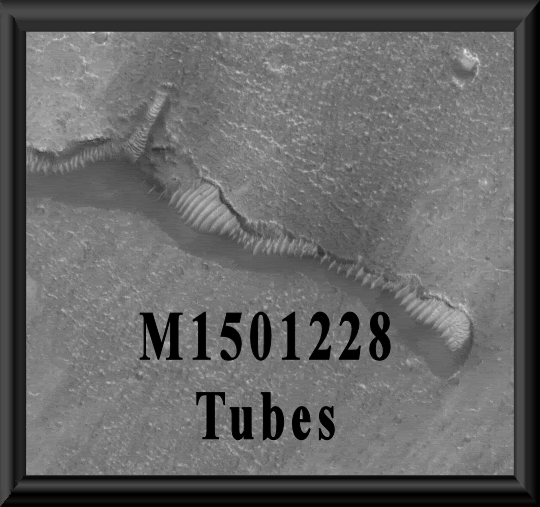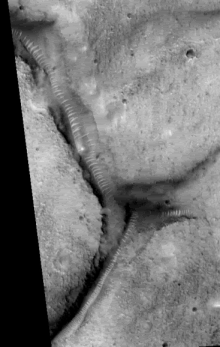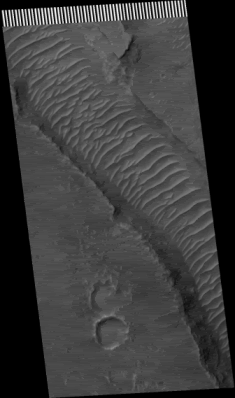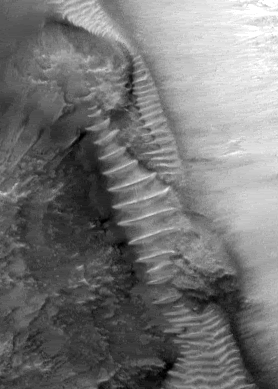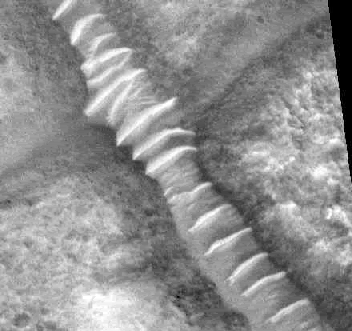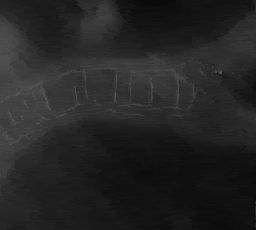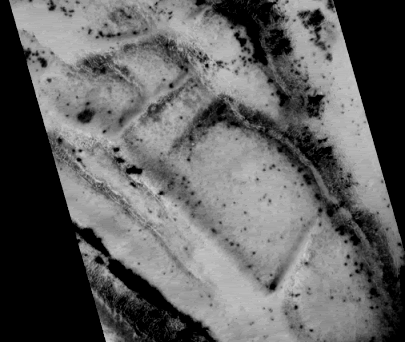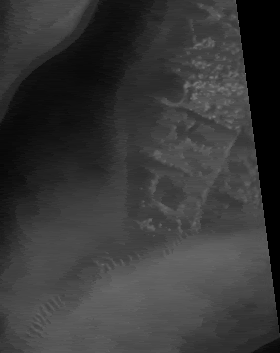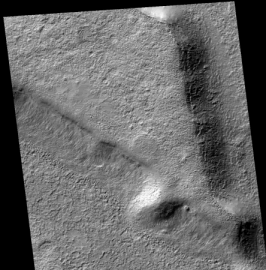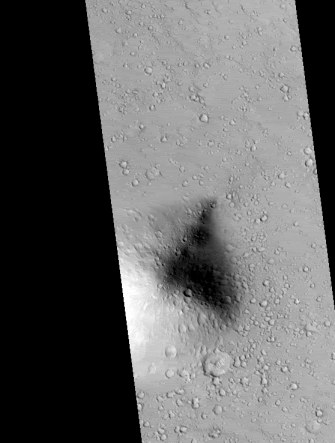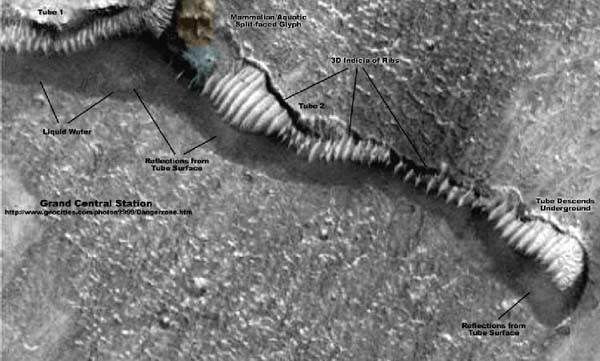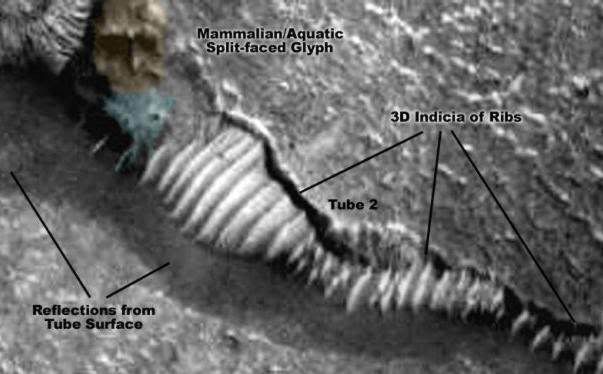- Thank you received: 0
URLs from Meta Research
- neilderosa
-
Topic Author
- Offline
- Platinum Member
-

Less
More
18 years 3 months ago #18787
by neilderosa
Replied by neilderosa on topic Reply from Neil DeRosa
<blockquote id="quote"><font size="2" face="Verdana, Arial, Helvetica" id="quote">quote:<hr height="1" noshade id="quote"><i>Originally posted by neilderosa</i>
<br />This tube was listed as key # 94 in my Keys topic. It is also in the same image strip as the “Dome in crater" shown above (#14 and 15 above). While looking up what has been said previously on the subject of the “glassy tubes” I saw that this image is the subject of a couple of nice papers on the subject. One is by Johnny Danger, one of the contributors to the MR URLs. The other is by Eric C. Lausch. A third short paper on the glassy tubes is by TVF.
www.geocities.com/photon9999/grandcentral.htm
www.viewzone.com/marsobject.html
metaresearch.org/home/viewpoint/archive/...ta-in-News010313.asp
All three papers report that David Pieri of JPL believes that the “tubes” are nothing but sand dunes. This might explain the cross ribs on some of the formations but it does not explain the translucent, 3 dimensional aspect of the tubes themselves as seen in #s 30, 31, and 32 above.
However, some “tubes” might very well be sand dunes or other types of erosion signatures.
Some commentators think the tubes may have been “Lowellian” water conduits to supply water to a civilization on a dying planet. At the very least, they should now be examined in detail.
One other possibility that has not been examined is that the “tubes” may instead be some form ice crystallization of previously flowing liquids in these channels and dry river beds. I don’t know if this is possible, but ice could explain the high albedo observed.
Neil DeRosa
<hr height="1" noshade id="quote"></blockquote id="quote"></font id="quote">
<br />This tube was listed as key # 94 in my Keys topic. It is also in the same image strip as the “Dome in crater" shown above (#14 and 15 above). While looking up what has been said previously on the subject of the “glassy tubes” I saw that this image is the subject of a couple of nice papers on the subject. One is by Johnny Danger, one of the contributors to the MR URLs. The other is by Eric C. Lausch. A third short paper on the glassy tubes is by TVF.
www.geocities.com/photon9999/grandcentral.htm
www.viewzone.com/marsobject.html
metaresearch.org/home/viewpoint/archive/...ta-in-News010313.asp
All three papers report that David Pieri of JPL believes that the “tubes” are nothing but sand dunes. This might explain the cross ribs on some of the formations but it does not explain the translucent, 3 dimensional aspect of the tubes themselves as seen in #s 30, 31, and 32 above.
However, some “tubes” might very well be sand dunes or other types of erosion signatures.
Some commentators think the tubes may have been “Lowellian” water conduits to supply water to a civilization on a dying planet. At the very least, they should now be examined in detail.
One other possibility that has not been examined is that the “tubes” may instead be some form ice crystallization of previously flowing liquids in these channels and dry river beds. I don’t know if this is possible, but ice could explain the high albedo observed.
Neil DeRosa
<hr height="1" noshade id="quote"></blockquote id="quote"></font id="quote">
Please Log in or Create an account to join the conversation.
- tvanflandern
-
- Offline
- Platinum Member
-

Less
More
- Thank you received: 0
18 years 3 months ago #19413
by tvanflandern
Replied by tvanflandern on topic Reply from Tom Van Flandern
The cited article on our web site is more of a commentary on what the "glassy tubes" are not: sand dunes or lava tubes. But my complete analysis and conclusions about what they most likely are appears only in MRB 13 #3 (2004). -|Tom|-
Please Log in or Create an account to join the conversation.
- neilderosa
-
Topic Author
- Offline
- Platinum Member
-

Less
More
- Thank you received: 0
18 years 3 months ago #18786
by neilderosa
Replied by neilderosa on topic Reply from Neil DeRosa
<blockquote id="quote"><font size="2" face="Verdana, Arial, Helvetica" id="quote">quote:<hr height="1" noshade id="quote">I've been watching for MRO images of intact tubes, but none have been released yet. I suspect they won't be anytime soon. It's too likely to be a "smoking gun". -|Tom|-<hr height="1" noshade id="quote"></blockquote id="quote"></font id="quote">
Very likely.
<blockquote id="quote"><font size="2" face="Verdana, Arial, Helvetica" id="quote">quote:<hr height="1" noshade id="quote">But my complete analysis and conclusions about what they most likely are appears only in MRB 13 #3 (2004). -|Tom|-<hr height="1" noshade id="quote"></blockquote id="quote"></font id="quote">
After your analysis you made this statement:
"Apparently, most of the glass tubes are real tubes or at least collapsed tubes, and we know of no terrestrial analogs. That doesn't require them to be artificial. But given near certain artificiality elsewhere, the artificial interpretation...is the simplest one available under Occam's Razor from among the possibilities now on the table." (MRB 13 #3 (2004)).
I agree with that too. But if so we require a model of ancient inhabitants of Mars on a large scale (otherwise why construct the tube network?). This could either mean that they were colonizers from elsewhere, (Planet V?), or that they were indigenous to Mars.
Very likely.
<blockquote id="quote"><font size="2" face="Verdana, Arial, Helvetica" id="quote">quote:<hr height="1" noshade id="quote">But my complete analysis and conclusions about what they most likely are appears only in MRB 13 #3 (2004). -|Tom|-<hr height="1" noshade id="quote"></blockquote id="quote"></font id="quote">
After your analysis you made this statement:
"Apparently, most of the glass tubes are real tubes or at least collapsed tubes, and we know of no terrestrial analogs. That doesn't require them to be artificial. But given near certain artificiality elsewhere, the artificial interpretation...is the simplest one available under Occam's Razor from among the possibilities now on the table." (MRB 13 #3 (2004)).
I agree with that too. But if so we require a model of ancient inhabitants of Mars on a large scale (otherwise why construct the tube network?). This could either mean that they were colonizers from elsewhere, (Planet V?), or that they were indigenous to Mars.
Please Log in or Create an account to join the conversation.
- neilderosa
-
Topic Author
- Offline
- Platinum Member
-

Less
More
- Thank you received: 0
18 years 3 months ago #15053
by neilderosa
Replied by neilderosa on topic Reply from Neil DeRosa
A few observations and conclusions:
There are very few faces or claims for faces in the URLs. Orme's "Crownface" (#82 and 83), JP's "Nefertiti" and RD's "Family" (89), Mike Pacasi's "Statue" (also called Easter Island Man), are about it. "Kingface" (75) is obviously the same face that I later independantly discovered, and called "Barbara," (#2 in Keys topic)but was probably not recognized by the editor of the URL's and presumably Greg Orme let the matter drop. Some less positive faces could have been claimed in M0203268 (81 above), M0201705 (85), M0403228 (60), and M1800558 (7), but weren't.
Many of the URLs including many I did not crop--there were nine pages of them--probably showed unusual or unknown chemical or geological processes, but were not artificial by any stretch of the imagination, nor were they, I suspect, intended to be.
“Tubes” were the overwhelming object type of interest. The jury is definitely still out re: their artificiality, but they are definitely—or should be—objects of interest for further imaging by NASA. If they are natural, they may represent some new, unknown phenomena.
There are other objects that may represent artificial structures or objects, such as 16, 19, and 35 above, which certainly warrant re-imaging.
#88- FHA01036 “Triangle” Orme, is not a triangle; there is no upper border. But the object certainly has features (uniformity, several flat, angular, related planes) that indicate artificiality, but are not conclusive, but warrant re-imaging.
JP's pyramid appears to be a great example of a classic 4-sided pyramid, and definitely warrants new imaging. It can even be dated by conventional crater counting.
There are very few faces or claims for faces in the URLs. Orme's "Crownface" (#82 and 83), JP's "Nefertiti" and RD's "Family" (89), Mike Pacasi's "Statue" (also called Easter Island Man), are about it. "Kingface" (75) is obviously the same face that I later independantly discovered, and called "Barbara," (#2 in Keys topic)but was probably not recognized by the editor of the URL's and presumably Greg Orme let the matter drop. Some less positive faces could have been claimed in M0203268 (81 above), M0201705 (85), M0403228 (60), and M1800558 (7), but weren't.
Many of the URLs including many I did not crop--there were nine pages of them--probably showed unusual or unknown chemical or geological processes, but were not artificial by any stretch of the imagination, nor were they, I suspect, intended to be.
“Tubes” were the overwhelming object type of interest. The jury is definitely still out re: their artificiality, but they are definitely—or should be—objects of interest for further imaging by NASA. If they are natural, they may represent some new, unknown phenomena.
There are other objects that may represent artificial structures or objects, such as 16, 19, and 35 above, which certainly warrant re-imaging.
#88- FHA01036 “Triangle” Orme, is not a triangle; there is no upper border. But the object certainly has features (uniformity, several flat, angular, related planes) that indicate artificiality, but are not conclusive, but warrant re-imaging.
JP's pyramid appears to be a great example of a classic 4-sided pyramid, and definitely warrants new imaging. It can even be dated by conventional crater counting.
Please Log in or Create an account to join the conversation.
- neilderosa
-
Topic Author
- Offline
- Platinum Member
-

Less
More
- Thank you received: 0
18 years 3 months ago #15054
by neilderosa
Replied by neilderosa on topic Reply from Neil DeRosa
<blockquote id="quote"><font size="2" face="Verdana, Arial, Helvetica" id="quote">quote:<hr height="1" noshade id="quote">If, as postulated by JPL, (David C. Pieri, Ph.D. Earth and Space Sciences Division of the Jet Propulsion Laboratory), these ribs are the crests of a Martian dune train, I would be curious to know what mechanism or geological process causes a sand dune to run 500 feet straight up a vertical cliff? And how, if composed of sand, are we able to peer above them into the darkness of the defile at the leftmost arrow and behind as well as between them at second and third arrows? It is beyond comprehension how anyone conducting an impartial investigation could come to the conclusion that this structure is a simple dune train! [Eric C. Lausch; see link above] (parentheses added)
<hr height="1" noshade id="quote"></blockquote id="quote"></font id="quote">
cropped from M1501228
Despite the polemic, this does help put the “tubes” question into context, at least as it pertains to scale or size of the objects.
Neil DeRosa
<hr height="1" noshade id="quote"></blockquote id="quote"></font id="quote">
cropped from M1501228
Despite the polemic, this does help put the “tubes” question into context, at least as it pertains to scale or size of the objects.
Neil DeRosa
Please Log in or Create an account to join the conversation.
- neilderosa
-
Topic Author
- Offline
- Platinum Member
-

Less
More
- Thank you received: 0
18 years 3 months ago #19416
by neilderosa
Replied by neilderosa on topic Reply from Neil DeRosa
<blockquote id="quote"><font size="2" face="Verdana, Arial, Helvetica" id="quote">quote:<hr height="1" noshade id="quote">It's clear that these crescentic dune-lets populate the landscape--and occur in all the low troughs or valleys throughout the image...They are a variety of sief and nearly barchan dunes--dead ringer analogs to those in terrestrial deserts. Turn the image 180 degrees (vs. the "Enterprise" picture) so that valleys look like valleys and craters look like craters, not bumps. The 3D striated "glass worm" illusion vanishes, and we're left with a fairly mundane image, exciting only to those of us who have studied the morphology of the valley networks on Mars.[David C. Pieri, Ph.D. Earth and Space Sciences Division of the Jet Propulsion Laboratory]
<hr height="1" noshade id="quote"></blockquote id="quote"></font id="quote">
Dave is probably referring to the LIE (light inversion effect) discussed in our paper on the "T or E" (MRB, V15 #2, June 15 2006). It is very easy to correct or compensate for that illusion by knowing where the sun is coming from and picking a crater that is obviously concave (a hole, curving inward) and not convex, (not a tennis ball embedded in the sand), and then extrapolating on to the tubes.
Most "glassy tube" advocates are not making that elementary mistake. By the way, if any debunker can come up with one of those "dead ringer analogs" from earth, that would be a big help in furthering the scientific debate.
<hr height="1" noshade id="quote"></blockquote id="quote"></font id="quote">
Dave is probably referring to the LIE (light inversion effect) discussed in our paper on the "T or E" (MRB, V15 #2, June 15 2006). It is very easy to correct or compensate for that illusion by knowing where the sun is coming from and picking a crater that is obviously concave (a hole, curving inward) and not convex, (not a tennis ball embedded in the sand), and then extrapolating on to the tubes.
Most "glassy tube" advocates are not making that elementary mistake. By the way, if any debunker can come up with one of those "dead ringer analogs" from earth, that would be a big help in furthering the scientific debate.
Please Log in or Create an account to join the conversation.
Time to create page: 0.268 seconds

